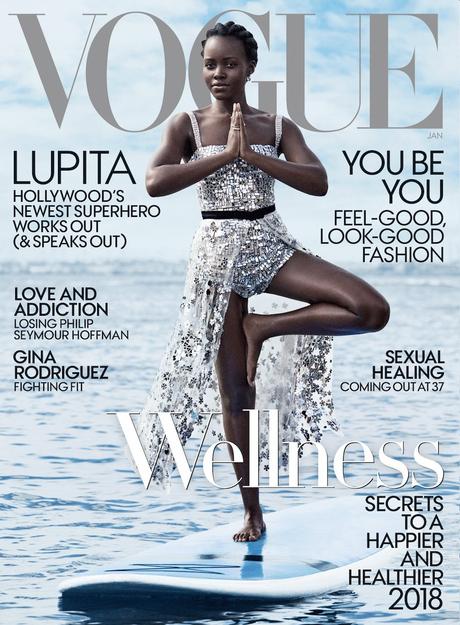Lupita Nyong’o: Colonialism causes ‘an identity crisis about one’s own culture’

Lupita Nyong’o scored her fourth Vogue cover for the January 2018 edition. I didn’t realize it at first, but she’s on Vogue to promote Black Panther! Yaaassss. Black Panther comes out in February! Something to look forward to while everything else burns to the ground. As for the shot they chose for the cover… I’m not into it. I love Lupita, I think she’s beautiful and amazing and all of that, but why did Vogue choose this shot? As for the interview… it’s good. She refuses to talk about a lot of personal subjects, but she gives Vogue enough good quotes to make it worth their time. You can read the full Vogue piece here. Some highlights:
She describes Black Panther as “brave for an action film”. Wakanda has never been colonized, and its traditions have matured without interference. “For me, as an African who lives outside Africa and wrestles with that dichotomy of tradition and modernity, this is almost healing.”
Black Panther flips the script on colonialist narratives: Ta-Nehisi Coates, who wrote a vivid Black Panther spin-off comic in 2016, describes it as “the fulfillment of some sort of deep wish that extends throughout the black diaspora to show that we are human, that we are beautiful, that we can be bad-asses, too. We’ve occupied such a servile place in film and TV,” he continues. “It’s nice to see that flipped.” Nyong’o agrees. “The little Kenyan child in me leaped for joy because it’s such an affirmation. What colonialism does is cause an identity crisis about one’s own culture.”
Boot camp with the cast: “Chadwick had a live drummer come in as we worked out, and it was so cool—it changes your sense of internal rhythm. My character fights with anything: guns, spears, ring blades, shoes, glass.”
She wants to retain her childlike sense of wonder: “That’s why I like to try new things, like pole-dancing” or mastering new languages and accents, and learning the ukulele for her next role. “I value not being good at things, because children are not good at things.”
She rejects questions about the difficulty of not being pigeonholed as an “actress of color”: “I got such a head start in this industry that it is not in my best interest to look for struggle. That’s such a powerless place for me to think about: what is working against me. I don’t think of what I don’t have; I think of what I do, and use that to get the next thing.” She is adamant about protecting her creativity. “It’s a finite reservoir, so it’s important that I safeguard it with my life.”
Her current mood is exhilarated and defiant. “I am here. I am happy to be here. I know this industry was not made for me. But I’m not going to apologize for being here.”
[From Vogue]
I love the balance of this statement: “it is not in my best interest to look for struggle.” Think about those words coming from an African actress who is probably still considered “too dark” by most Hollywood producers and casting directors and more. Think about how many white actors love to put on airs about their own “struggles” and how no one understands how difficult it is for them. Yes, Hollywood was not made for Lupita. But she’s not going to apologize for being there. Queen Lupita!
Photos courtesy of Mikael Jansson for Vogue Magazine.
Source: Lupita Nyong’o: Colonialism causes ‘an identity crisis about one’s own culture’
4 total views, 4 views today
